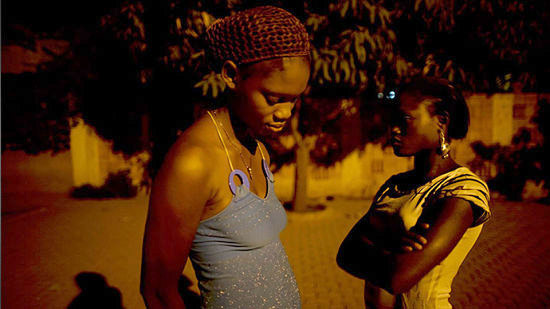
by Heather Ragan-Kwakye
Gifty and Joy liked to say, “One for love, many for money!”
They had a shoe collection like Imelda Marcos’, lined neatly along one wall of their simple sparse room at the Hotel de California in the Adabraka neighborhood of Accra. A traveler’s hotel, popular with tourists from around the world with its dingy charm, 1930’s British colonial architecture and reasonable rates, the California was a great place to start a new life. A ceiling fan in their room was extra and happily paid for. Two narrow, foam-mattressed single beds, a well-swept concrete floor, two suitcases set up on the floor along one wall as “closet space.”
Joy and Gifty had come in with the most recent tidal flow from Nigeria to Ghana; the one driven by more stable politics and economics and familiar English and pidgin, drifting across Benin and Togo into the arms of what they hoped would be well-paying expats and locals in a growing metropolis.
Gifty was an experienced seamstress back home, but couldn’t wait to plan her wedding, be married and teach primary school back in Nigeria. Joy was hoping that her fiancé would help her to become a nurse.
They began at the Kilimanjaro Bar, a hot-spot for Nigerian sex-workers and expats to hook up. I was their shadow for three months.
We lay on their motel room floor, giggling about breasts and beauty and bodies and penises and romance and faux romance and pick-up lines.
They were hopeful entrepreneurs, wide-eyed planners and dreamers who slept curled around one another like birth sisters, twins embracing away the cash transactions and indignities of first-time drunkenness and the men who used their vessels as repositories for their own disconnected loneliness in a place thousands of miles from a sense of Home.
Over the months, the girls became competitive with other Nigerian women on the road to anywhere else, and with locals who didn’t enjoy immigrant laborers in the sex trade scene.
Lighter was better, they told me and each other. I watched as they experimented with bleaching creams from China with no instructions or warnings in English or any other local language. Their faces and necks and arms became blotchy with chemical burns from extended applications. Their eyes dimmed with nights of insults and injuries, the exchange they endured for dreams that receded little by little with the ebb tide back across the borders.
The shoe collection for a time remained immaculately kept, polished and neat. Their colorful wraps and skirts and gowns stayed impeccable, hand-washed in buckets, line-dried, lightly starched and iron-pressed, and hung brightly on wire hangers on a taut string between two nails, across the wall above their shoes.
But their bodies in three short months became transfigured receptacles of disdain for loneliness, for misogyny, for desperation, for hatred, for everything anti-love.
One night, I was walking along a roadside dirt path from a tro-tro stop to meet a friend at a Lebanese-Italian pizza joint in Osu, a well-heeled neighborhood that had a western-style grocery store. I hadn’t been able to find Gifty or Joy for about three weeks. Their room and their shoes had disappeared.
Out of the darkness, lit only by peripheral passing headlights and the tiny kerosene lamps made from condensed milk cans with shoelace wicks on several street food and cigarette vendors’ tables…out of the darkness came Joy. Her eyes were glazed, her face nearly unrecognizable, her left arm askew, healed as a broken arrow pointing towards a different future. A man who didn’t want to pay, she said. A white man. He had beaten her. She had fought. He had thrown her out of a moving car near Labadi Beach.
I held her tightly for a long time against my own daughter, now growing in my belly just 6 months.
“Tears are for children,” she said, trying to adjust her fractured posture, “Children cannot endure a woman’s work.” she said, “I’m going now. Okyena, wai, tomorrow.”
She was 18.
I didn’t see her again.


